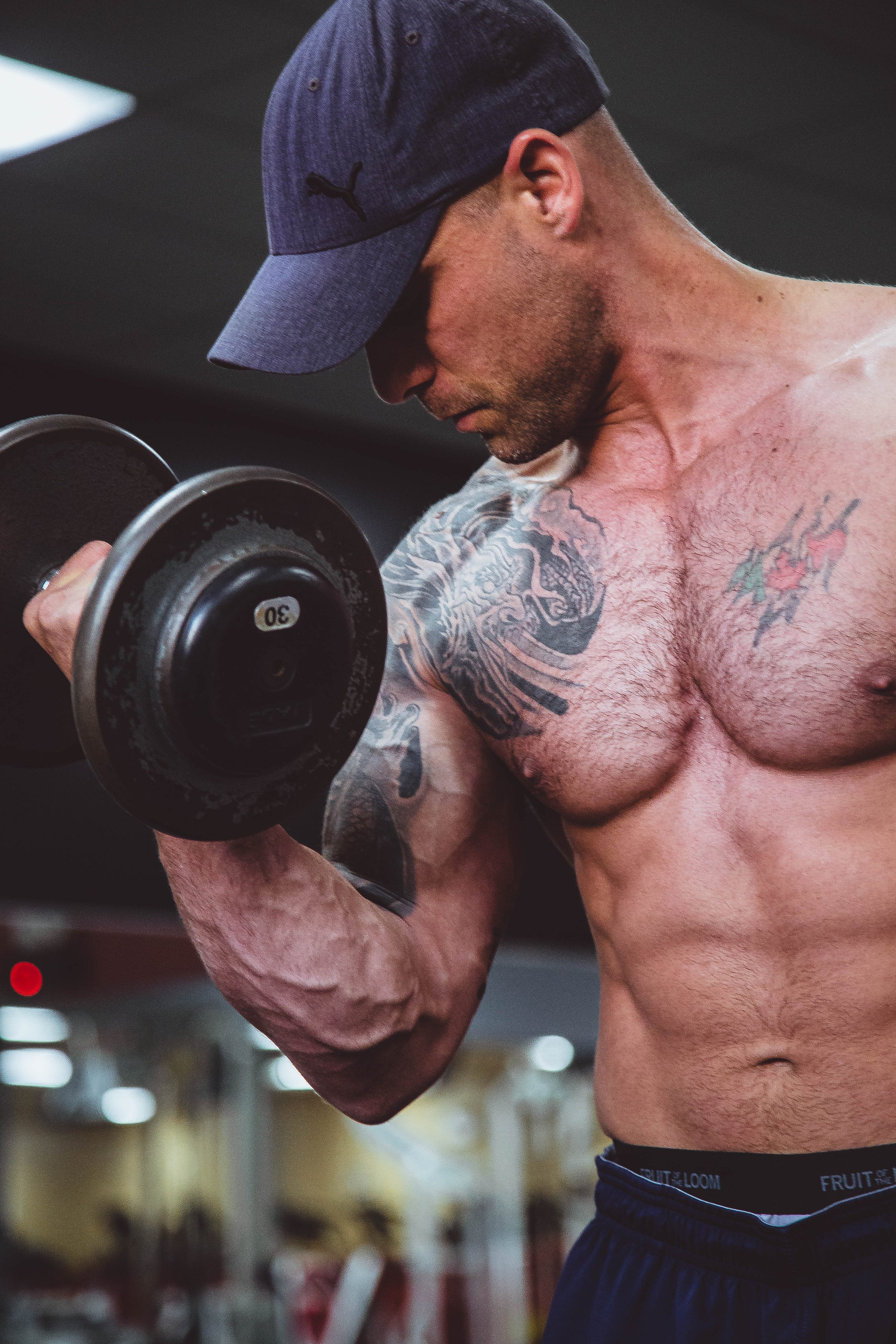
This morning I read a smart piece by Medium peep Zack Harris about building lean muscle. As a bit of a muscle head myself (46 years and counting) I was interested in his points. Part of what struck me were his comments about form.
Every year, like clockwork, millions of us commit to the gym (whether that’s where we really belong or not, I’ll get to this in a sec) and hit the weights two days after the hangover subsides. Someone gave us a membership or we ponied up. My parents did that for me forty-two years ago. Whichever company now owns my lifetime membership loses money on me big time because I actually use it, religiously, year after year. It costs me $10 a YEAR to renew. Dude. I mean, come on man.
Many of those who are showing up are either brand new to the weight room or exercise machines, or they have been on a long hiatus, or their spouses have shamed them into showing up, or they are sick and tired of being sick and tired, or they really and truly are committed. This is the first of millions of steps to be repeated on the gym floor over their lifetimes, for the gym becomes a treasured place to dump pounds, dump weakness, dump stress, and dump outdated notions of what you can or cannot accomplish with your body.
When I began, all I saw were men. Big men, screaming HUGE at each other, clouds of white chalk puffing into the air around their heads. Being a tomboy, and loving strength- I’m a farm girl- I felt right at home. However, back then the folks who impressed me the most were the loudest.
They were often the guys whose form sucked. I had no clue. These were the early days of Arnold and Joe Weider, the coming explosion of bodybuilding as a competitive sport to a much larger audience, and still years before I would see women regularly in the weight room. I was on my own.
In my eagerness to learn, I began emulating the sling method of lifting. I would pick up a pair of dumb bells that were easily fifteen pounds heavier than I had any business lifting, and, to show off that I could indeed lift them, I would hurl them upwards while using momentum instead of pure strength.
It cranked my back out of whack. I am very lucky I didn’t do permanent damage. My knees were hyper-extended, because I knew no better, and besides, that’s what the guys were doing.
I would wager most of those men either can’t lift any more, or as Zack pointed out, they probably had rotator cuff surgery. Or fused vertebrae.
It’s been too many years for me to recall the quiet, sober guy who walked over to me and gently explained body mechanics. How throwing weight around as I was doing was a recipe for injury. And, that truly strong people never dropped their weights, because they didn’t work with anything too heavy. Or, if they did take on a challenge, they had a competent and trusted spotter who would guarantee that the weights were lowered gently to the ground.
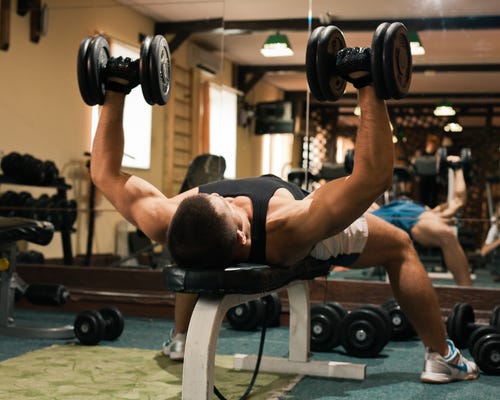
Why is this important?
If you’ve ever seen a dumb bell dropped to the gym floor from waist height, you know. That’s one hell of a lot of weight that is going to bounce in a totally unpredictable direction, combining gravity and speed.
Not only is this incredibly stupid, it’s selfish. Imagine a pair of 90-lb dumbbells dropped out of a guy’s hands because he’s trying to show off just how hard he’s working. One bounces in your direction and promptly breaks your tibia. I’m sure you’re impressed now.
Most of us who have never been inside a gym have little clue about form. Too many of us are too ego-invested to bother to ask one of the trainers, or to actually purchase a package of personal training. To my mind, better you and I invest in that kind of guidance up front than end up in traction and in shock from hospital bills later. It’s a sane investment in both your confidence and competence.
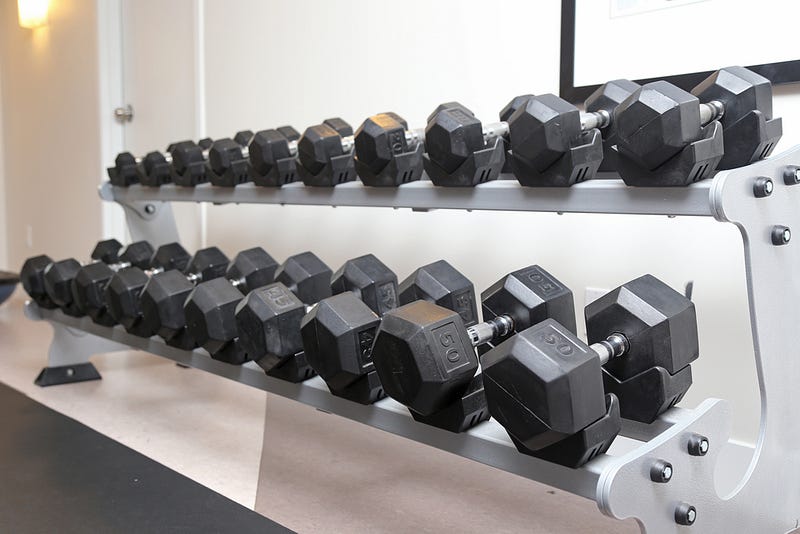
That goes for some of us old fogies who have been out of the gym for years. While I completely understand the embarrassment you might feel heading to the sissy end of the weights- the fifteens- rather than hefting a pair of fifties, folks, your body isn’t going to like you much.
Look. It’s really surprising, if you were an athlete in your youth, how fast your strength can come raging back. Not only that, you can even surpass yourself, depending on how respectfully you begin the process. Muscle memory is there for life, and we just need to come knocking.
With gentle knuckles, not a two-by-four.
The New York Times regularly runs stories like this which make it abundantly clear that the gym (or the track or the woods or the pool or your bike) will give you at any age, a brand new lease on life.

There are two pieces to this. First, weight work of some kind, including workouts using only your body weight, are just as essential as aerobic work. Doing one without the other isn’t enough.
Second, back to form. Doing it right, especially as we age, and our bodies have changed, is not only important, it’s essential. The body mechanics you have at 61 involve changes possibly brought on by poor sitting habits, disease, injury, weight gain or loss. Seeing a physical therapist ( I hesitate to say doctor, unless said doctor is an athlete themselves) gives you a solid baseline on where you are and how best to start.
However as with any training program you would be wise to have a full health workup, because if you’re not aware of underlying problems, exercise could be problematic in ways you wouldn’t anticipate. Not all exercise is good, and sometimes certain exercise is righteously bad for you because you have a heart problem. Find out before you start.
I see far too many folks pick up way too much weight-likely what they could do twenty years ago- and assume that they still can do a set of 15 with fifty pound dumbbells. No. You can’t. While you most likely can work back up to it, a swift path to the ER is to assume that what you did at 21 is what you can do now.
Being ex-military, I have an internal drill sergeant. I have had to sit that cranky bastard down at times when I am in recovery, then rehab, then back to the sissy end of the weight rack. Nobody cares that much about whether you or I are slinging big weights, because for the most part, most of us are far too focused on our own workouts.
Okay I lied. There’s a trio of guys (91, 66 and 80) who hover around the weight area, have for years, and point out women’s tits and butts, and do their best to butt in on our workouts and flirt. God bless ’em. They’re there but they aren’t working out.
That said, when and if you hit the gym in a few days, whatever your motivation, I sincerely hope you both like and respect yourself enough to do the research on good form. Books, videos and programs abound. It is far, far better to find that you have a shoulder that can handle military presses (a point that Zack made to me in his comments) before you start doing them, for it’s a tough exercise and damaging to shoulders that are not designed for overhead work. That’s just one example.
A very good PT, and a very very good trainer, can show you how to do the same exercise without pain or strain. You can change the angle of a wrist, use a different arc, there are hundreds of variations. There is no one way. There is only one way that is right for YOU. Your unique body, your strength level.
Zach pointed out to me- and this is so very true about diet, about exercise, about so many things in life- that how you lift depends. It always depends. Your unique physiology, your bone structure, whatever genetics may suggest (but not necessarily dictate). For me that’s been an exciting journey for the last five decades. I’ve ended up at 67 with hard muscle, remarkable strength and endurance, and the kind of body confidence that comes of being at ease with what I’m good at physically, and what I’m crap at physically.
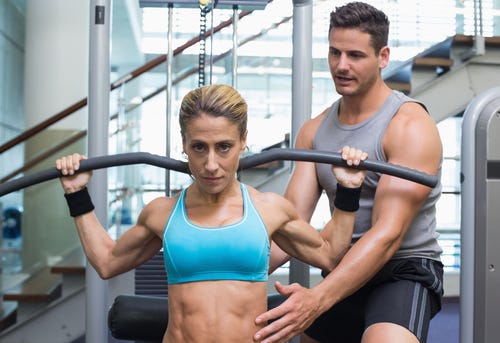
There’s no question that weight work has saved my life several times over. Not only that, I still don’t need movers to help me pack my house until I get to my enormous bed and the huge couch. That’s not bragging. Those are life skills. It is wonderful to be strong, vital, and energetic at 67. I would passionately wish those benefits on anyone else. And research consistently shows that no matter how old you are when you start, the body eagerly responds to your request for work.
As long as you do it properly, starting where you are, with respect, a sense of humor and above all, patience.
If you want to continue lifting, whether to compete, regain your strength, feel better or whatever (exercise alone will NOT help you lose weight, please, that’s another article), I would love to see you make it past March. I would love to see you there on Boxing Day and on New Year’s Eve Day. I would love to see you gain strength, power, confidence, and that lovely gym swagger that those of us who have spent most of our lives in sweat-grunt-chalk-and-fart environments have earned. We belong there. We own our space there.
And for my part, I’d love to see you thrive there, too. Please, do the work to find out how to lift for you. You are worth it.
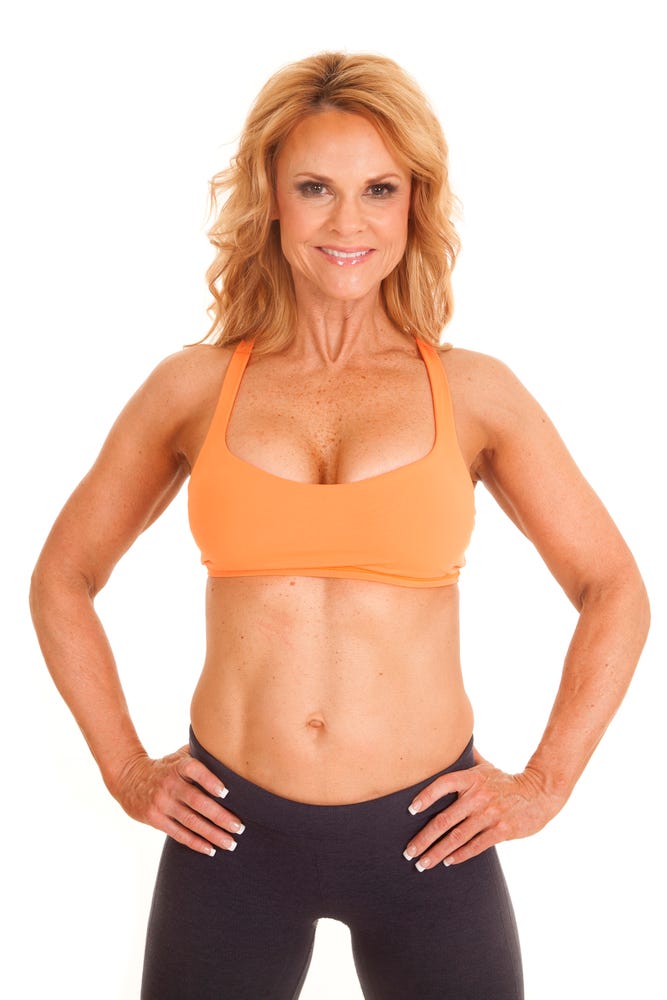
Comments powered by Talkyard.